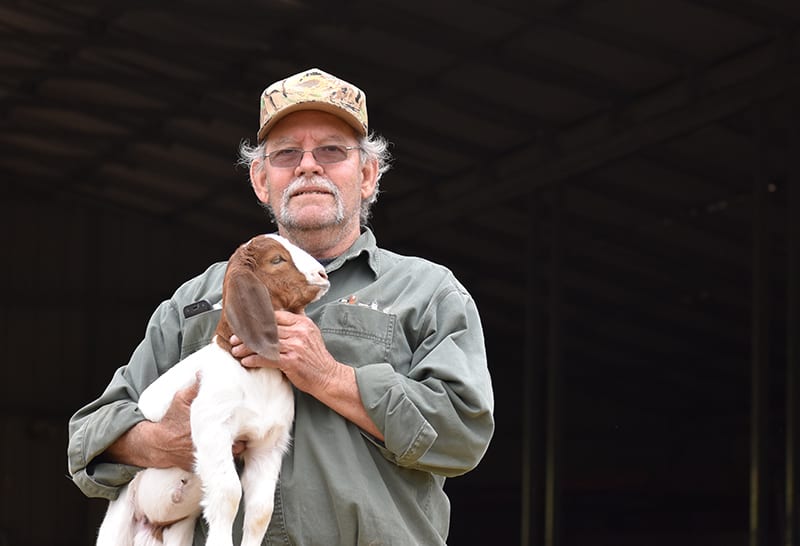
Billy Martin and “his better half” Pat raise goats along with cattle, chickens, guineas, dogs, cats and one horse on their farm on Bending Oak Drive in the Catawba Valley. For the last couple of months, their time has been mainly spent watching over their goat herd.
The goat herd consists of 36 does (females), two billies (males) and one wether (castrated male). Thirteen of the does are young ones that won’t be bred until next year. Most of the goats are Boers, with some LaMancha and Kiko, all meat breeds. The does are bred to kid in March and April, so those months are especially busy for Pat, who is the main caregiver. Billy helps with evening chores, maintains the fences and does the hay baling along with numerous other farm chores.
Pat tries to attend every birth and said she never leaves a doe while that’s happening, just in case some help is needed. Billy and Pat ended the 2018 kidding season with 51 kids from 23 does, with 52 kids born alive and two born dead. One newborn was mashed soon after birth. This is impressive, but even more impressive is the fact that they had not just one set of quadruplets, but two sets…..and all eight of them are alive and healthy. These are of the Boer breed and quads are rare, with only 1 percent of Boer goats producing quads. The first quads were born on March 29. The mother, Bambi, and her babies were kept in the barn for a few days and then allowed to go out into the pasture, with access to shelter at all times. With so many little ones, Bambi needs help feeding them, so the kids get bottles three to four times a day.
On April 22, Betsy produced the second set of quadruplets, all of them alive and healthy. After staying in the barn for a few days where they could be closely observed and given supplemental bottle feedings, they are now turned out with the rest of the herd. The kids still get bottles three to four times a day.
Billy and Pat give the goats the necessary vaccinations, deworming and hoof care. The goats are raised for meat and some are sold at local stockyards. Others are sold on the farm, for meat or as breeding stock or pets. They are fed hay until their pasture is ready for grazing, along with occasional grain. All of them appear very healthy.
Bo is the only wether on the farm and he’s not only a pet, he is a kid babysitter as well. He can be seen in the midst of several kids, watching over them while their mothers are grazing in the distance. Even though he had no role in producing any of the kids, it appears that does require Bo to help with kidsitting.

With all of the time required to care for the goats, especially during kidding time, you might wonder why anyone would want to raise them. Pat says “I just fell in love with them.” Her love is apparent as she walks among them, calling each by name, picking up and talking to the little ones, and relating stories to many of them. She says that goats can be housetrained just like dogs. Elvis, now about five-weeks-old, gets several bottles each day and sometimes comes inside to wait for a bottle. Pat is now bottle feeding 11 kids, some getting four bottles a day and some only getting one bottle.
Pat emphasized that all of the goats are friendly, and she welcomes visitors who want to see them. Each goat has a name and Pat can identify each goat! If you go to see the goats, Pat advises you to wear clothes and shoes suitable for the farm because the goats will be very near visitors. Call ahead for directions and the best time to visit – 540.384.8014. Don’t be surprised if you want to take one of the little ones home with you!
-Submitted by Ann G. Harrell



